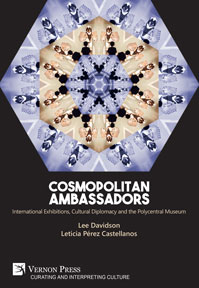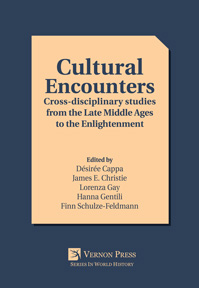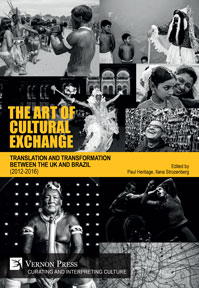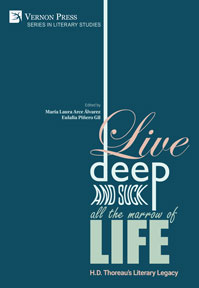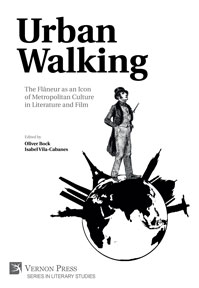Wall to Wall: Law as Culture in Latin America and Spain
Carlos Varon, Cristina Pérez, David Yagüe González, Ana Yáñez Rodríguez (Eds.)
by Aurélie Vialette (Stony Brook University), Daniel Aguirre-Oteiza (Harvard University), Daniela Dorfman (Universidad Nacional de San Martín (LICH-UNSAM), Argentina), María Fernanda Lander (Skidmore College), Gloria Elizabeth Chacón (University of California, San Diego), Iván Trujillo (University of California, Riverside), Benjamin Easton (Brown University), Pauline de Tholozany (Clemson University), Lauren G.J. Reynolds (University of North Alabama), Ignasi Gozalo-Salellas (Bryn Mawr College), Gabriela Balcarce (Universidad de Buenos Aires - CONICET)
Purchase this book
(click here to change currency)
'Wall to Wall: Law as Culture in Latin America and Spain' comprises interventions from a wide array of scholars based in the US, Spain, and Latin America, exploring the encounter of Hispanophone cultures and the law. Its contributors delineate a fraught relationship of complicity, negotiation, and outright confrontation covering five centuries and a truly global landscape, from Inquisitorial processes at the onset of the Spanish Empire to last-ditch plans to preserve it in the 19th century Philippines, to the challenges to contemporary articulations of the nation-state in Catalonia.
Beyond single, specialized time-period and national cultures, 'Wall to Wall' embraces and showcases the heterogeneity of the field, covering both well-known territory (Argentina, Mexico, Spain) and often-neglected cultures (Venezuela, Philippines, and indigenous communities in the Yucatan area), as well as problems that cannot be narrowed down to the nation-state (exile, independence processes, non-state laws, translation of foreign cultures). Contributors include: Aurélie Vialette, Daniel Aguirre-Oteiza, Daniela Dorfman, María Fernanda Lander, Gloria Elizabeth Chacón, Iván Trujillo, Benjamin Easton, Pauline de Tholozany, Lauren G.J. Reynolds, Ignasi Gozalo-Salellas, and Gabriela Balcarce.
The chapters included foreground the conceptual diversity of the field, in dialogue with issues in literary and visual culture, (post-)colonialism, race, nationalism, gender, and class. Not only do they place vernacular objects in dialogue with current international concepts and methods, but these essays also aim to advance an autonomous conceptual and theoretical work-based approach. Its chapters aspire to enter a global discussion around the state-centered aspiration to shape culture and the many literary and cultural practices that escape it; researchers of those issues and Latin American and Iberian studies will find new venues to rethink their global archive.
Introduction: Cantinflas’s ass, before the law
I. Writings on the wall
Chapter 1
From penal colony to colonial village: the biopolitical laboratory in the Philippines for the protection of race, family, and the promise of a renewed Spanish Empire
Aurélie Vialette
Stony Brook University
Chapter 2
Remarking (on) the law of genre in exilic poetry: the politics of poetic memory in León Felipe
Daniel Aguirre-Oteiza
Harvard University
Chapter 3
Law or desire: politics of eroticism in Argentinean art and literature (1959–1989)
Daniela Dorfman
Universidad Nacional de San Martín (LICH-UNSAM), Argentina
Chapter 4
Y recuerda que te espero by Juan Carlos Méndez Guédez: seeing and being seen in revolutionary Venezuela
María Fernanda Lander
Skidmore College
Chapter 5
Fictionalizing Indigenous Rights: Exploring Reparations in Chen tumeen chu’úpen/Sólo por ser mujer by Sol Ceh Moo
Gloria Chacón
University of California, San Diego
Chapter 6
Decontamination, nationalism, and complicity: the problem of representation
Iván Trujillo
University of California, Riverside
II. Walls come tumbling down
Chapter 7
Unmasking the other: strategies of discourse between the pícaro and the inquisitor in Lazarillo de Tormes and El Buscón
Benjamin Easton
Brown University
Chapter 8
Narrative as legal precedent: thoughts on Flora Tristan’s impatience
Pauline de Tholozany
Clemson University
Chapter 9
Youthful transgressions: youth reform and minor revolutions in Jorge Amado’s Capitães da areia and Cristina Peri Rossi’s “La rebelión de los niños”
Lauren G.J. Reynolds
University of North Alabama
Chapter 10
Sovereign Spaces: Law and Legitimacy in the Catalan Pro-Independence Struggle (2010-2019)
Ignasi Gozalo-Salellas
Bryn Mawr University
Chapter 11
Democracy to come: the importance of otherness as different ways of living
Gabriela Balcarce
Universidad de Buenos Aires - CONICET
Notes on Contributors
Index
Cristina Pérez-Arranz is a Lecturer at Emerson College, where she teaches Travel Literature and Transnational Literature. She has served as a Member-at-Large for the Poe Studies Association since 2016. She holds a PhD in Literary Studies and specializes in the emerging sciences and pseudosciences of the late 18th and 19th centuries.
Carlos Varón González is an Assistant Professor at the University of California, Riverside. His work on the politics of aesthetics in Spain and Latin America, from José Martí to Marta Sanz, has appeared in Revista de Estudios Hispánicos, the Journal of Spanish Cultural Studies, and Studies in Twentieth- and Twenty-First Century Literatures. His first book, 'La retirada del poema: Literatura hispánica e imaginación política moderna', addresses post-dictatorial ideas about poetry in Spain and Latin America (2020). His current research project, tentatively titled 'I Feel Your Pain: The Political Mobilization of Affect', concerns the affective practices and political struggle in Peninsular culture. This is the second book he has co-edited with the Transatlantic Literatures research group, after 'Shining Signs of the Day: Spaces and Senses in Transatlantic Culture' (2019).
David Yagüe González is a 5th-year graduate student in Hispanic Studies at Texas A&M University and co-founder of the Latinx Cultural Production working group with Alberto Moreiras. He has a PhD in African American literature from the Universidad Complutense de Madrid with a dissertation that mainly focused on trauma in Toni Morrison's works. During his research, he worked at Harvard University as a Teaching Assistant in the Romance Languages and Literatures Department, where he is the co-chair of the Transatlantic Studies research group. He has published articles on biopolitics, animality and gender with his article 'Animalidad y Animalización en Amores Perros' published in Miriada Hispánica (2017) as well as his forthcoming article on masculinity in Cuban film 'Looking for Something to Signify: Gender Performance and Cuban Masculinity in Viva' published in Screen Bodies (2020).
Ana Yáñez Rodríguez is a Lecturer in Spanish in the Global Languages Department at the Massachusetts Institute of Technology (MIT) where she has served as the Spanish Language Coordinator for several years. She teaches a broad range of courses from basic and intermediate Spanish language classes to advanced language and culture courses. Her areas of interest include technology in language education, visual media in teaching and learning languages, Hispanic literature and film, and transatlantic studies. She previously co-edited 'Shining Signs of the Day: Spaces and Senses in Transatlantic Culture' with the Transatlantic Literatures research group.
biopolitics, Spain, Latin America, colonialism, gender, deconstruction, transatlantic studies, literature, film, translation, legal culture
Subjects
Sociology
Law
Series
Curating and Interpreting Culture
Related services
Find in a library near you Download HQ cover Find in Bookshop.org Find this title in AmazonSee also
Bibliographic Information
Book Title
Wall to Wall: Law as Culture in Latin America and Spain
ISBN
978-1-64889-376-6
Edition
1st
Number of pages
231
Physical size
236mm x 160mm

![Wall to Wall: Law as Culture in Latin America and Spain [Paperback]](/file/16015/df4997a306102f9dfac910ba3175d63b/1638446314.jpg)

